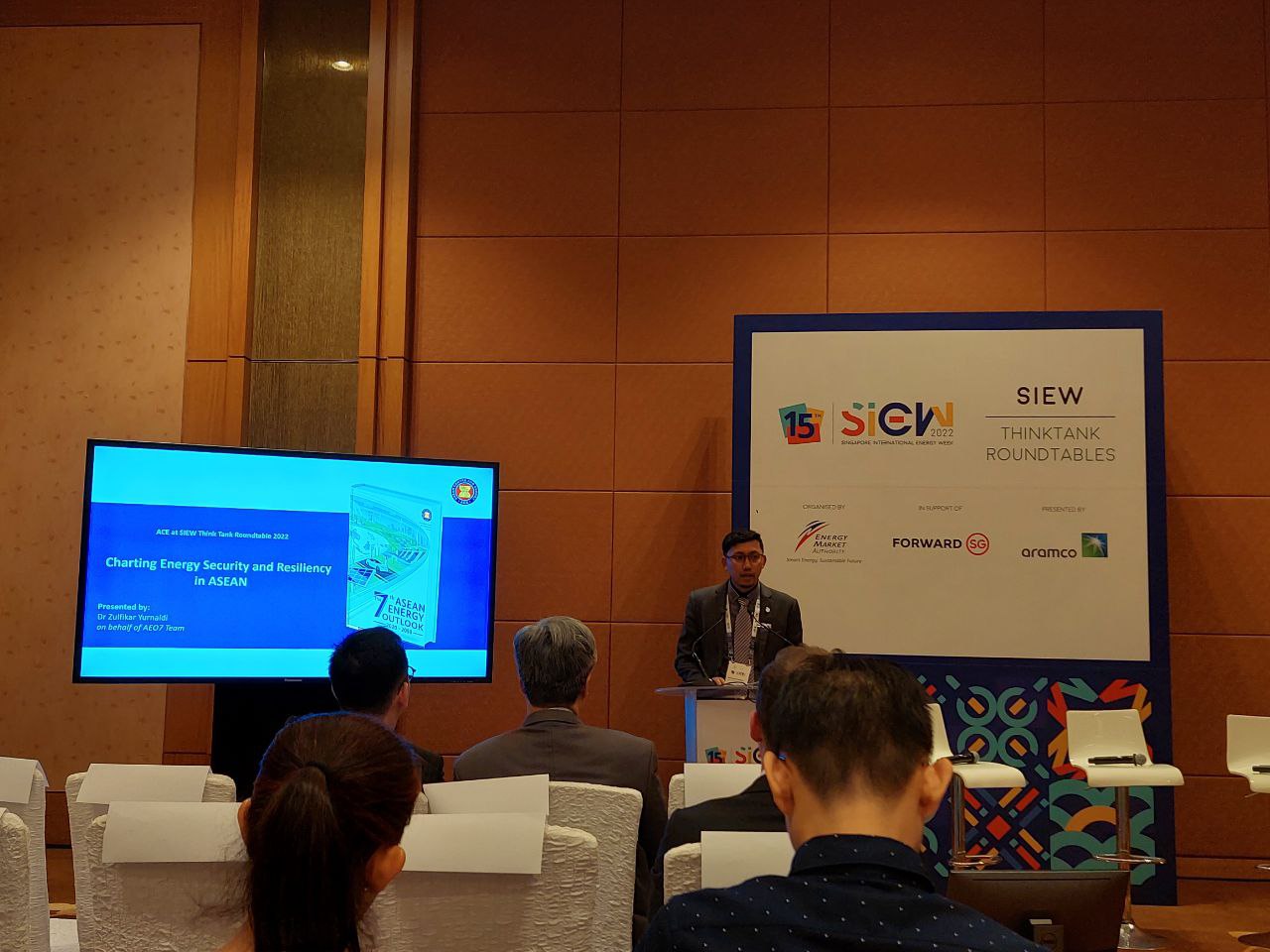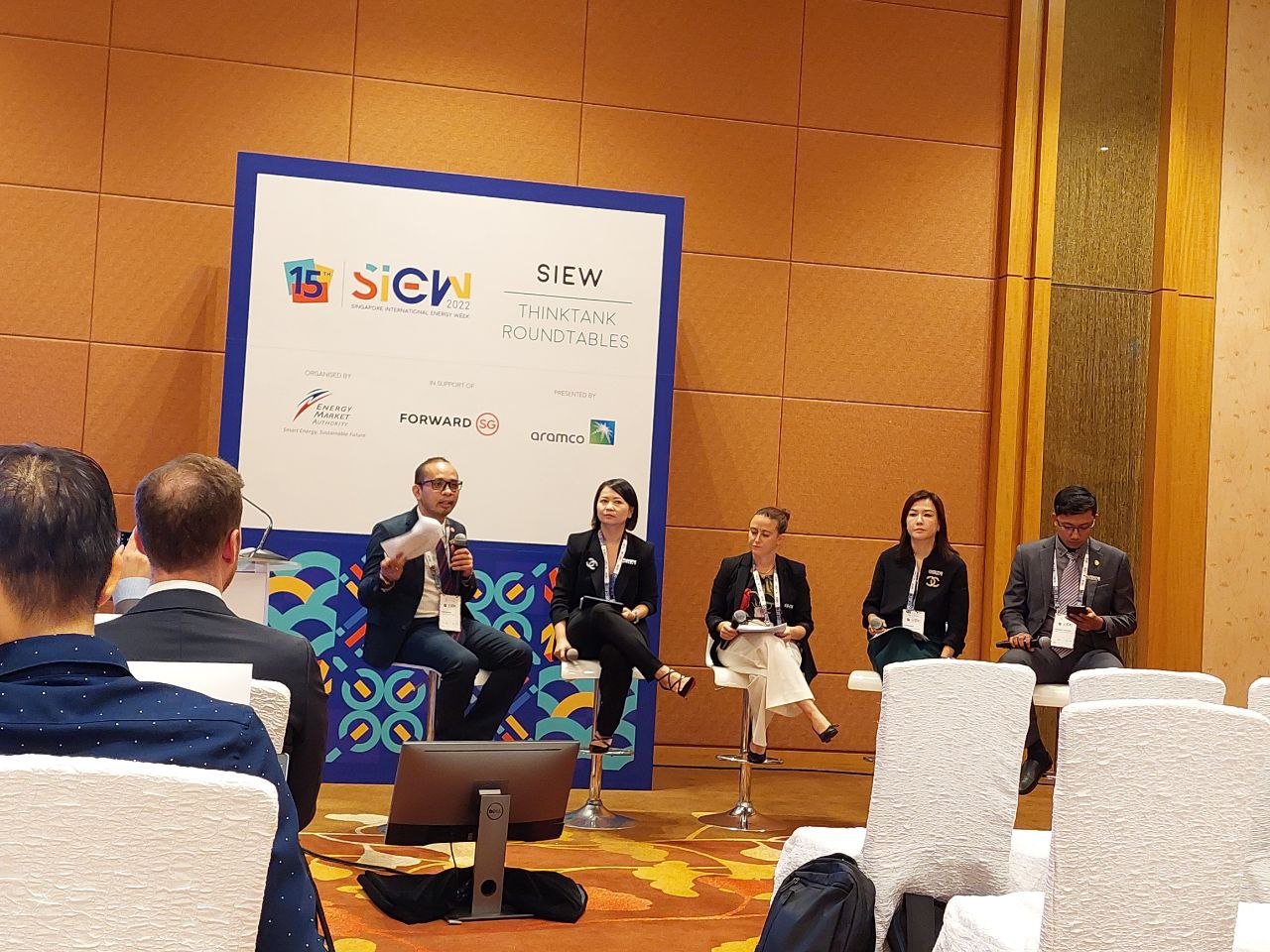Menu
Singapore, 27 October 2022
On 27 October 2022, the ASEAN Centre for Energy (ACE) participated in the Singapore International Energy Week (SIEW). This is an annual platform for energy professionals, policymakers and commentators to share best practices and solutions within the global energy space. Every year, ACE is given the opportunity to host a Thinktank Roundtable at SIEW. This allows us to disseminate our work on energy in the region—under the ASEAN Plan of Action for Energy Cooperation (APAEC) 2016-2025—to the wider audience and to build collaboration with various existing and potential partners. The event is also a venue for ACE to leverage our position as the leader in energy cooperation within ASEAN.
In line with this year’s Singapore International Energy Week (SIEW) theme, titled “A Resilient and Sustainable Energy Future”, ACE hosted a Roundtable session on “Charting the ASEAN Energy Security and Climate Resilient”. Opening with the key findings from the 7th ASEAN Energy Outlook (AEO7) related to assessing measures for energy resilience, the Roundtable brought together leading experts with different experiences to discuss existing efforts and future strategies to ensure energy security as ASEAN undergoes the energy transition.
Dr Nuki Agya Utama, Executive Director of ACE, delivered the opening remarks where he addressed the increasing energy demand even as the world is undergoing the energy transition. This was followed by Mr Jonathan Goh, Director, External Relations Department, Energy Market Authority Singapore, who conveyed the importance of seeking a right balance between energy security and building climate resilience.
 Figure 1. Dr Zulfikar Yurnaidi of ACE presents the key findings from the 7th ASEAN Energy Outlook. (Photo by PZP)
Figure 1. Dr Zulfikar Yurnaidi of ACE presents the key findings from the 7th ASEAN Energy Outlook. (Photo by PZP)
Dr Zulfikar Yurnaidi, Senior Researcher from ACE, also the AEO7 Team Leader, presented the key findings from the newly published 7th ASEAN Energy Outlook (AEO7). The AEO7 uses historical data and projects multiple scenarios to model the ASEAN energy landscape until 2050. One of the key findings that Dr Zulfikar introduced is the new scenario based on optimisation – the Least-Cost Optimisation (LCO) Scenario, that considers cost-effectiveness, affordability and technology maturity to fulfil electricity demand in its evaluation of potentially viable technologies.
The Roundtable, led by Mr Beni Suryadi, Manager of Power, Fossil Fuels, Alternative Energy and Storage (PFS) Department, ACE, surrounded three (3) main topics: Energy Security and the Energy Transition, Financing to Secure Energy Transition, and Fuels and Energy Technologies for Climate Resilience.

Figure 2. Mr Beni Suryadi of ACE is moderating the panel discussion. (Photo by PZP)
Kicking off the panel discussion on the topic of Energy Security and the Energy Transition was Ms Jennifer Tay, Partner and Infrastructure Leader, PwC Singapore, who conveyed the importance of balancing socio-economic development with the energy transition. She also offered a business perspective that the current energy crisis has brought about new opportunities and accelerated business considerations and investments in renewables.
Adding to Ms Tay’s point, Dr Zulfikar noted that the volatility brought about by the crisis has led to shifts in policies and countries have been actively learning and adapting to these changes. On the other hand, Ms Jeanne Soh, Head of Renewable and Sustainable Energy, Structured Finance Department Asia Pacific, Sumitomo Mitsui Banking Corporation, shared a less optimistic view that the reason for current statistics falling below targets is due to the lack of contractual framework set in place and the slow speed of implementation of renewables. Ms Irina Lazzerini, Principal Specialist, Clean Energy, SEforAll, stated that it is essential to take into account the uniqueness of each country and the levels of readiness and development difference across the countries.

Figure 3. Ms Jeanne Soh of Sumitomo Mitsui Banking Corporation is sharing her perspective on financing perspective. (Photo courtesy of SIEW)
The discussions continued on the importance of financing to secure the energy transition. Mr Suryadi posed questions on the role of fossil fuel companies in the energy transition and the relevant financing required to support transition in the ASEAN region. Ms Soh noted that most financial institutions have stopped financing and supporting coal projects due to their net-zero Environmental Social Governance (ESG) goals and that even gas projects are under scrutiny. As such, fossil fuel companies are shifting strategies and investing in hydrogen and renewable research. She pointed out that less capital deployed to financing fossil fuels could possibly act as a catalyst for further green development. Ms Tay then shared that there is a significant upfront investment required into adopting new technology as beyond the sole technology, upgrading supporting infrastructure plays a large role in ensuring that the renewable generation capacity and efficiency can be maximised. Ms Lazzerini added that climate targets are heavily dependent on global funding, and the climate fund should be flexible enough to support not just renewables but the value chain that goes into it. She then cited that current financing of USD 59 billion is significantly below the target of USD 201 billion.
In their final remarks on Fuels and Energy Technologies for Climate Resilience, the panellists acknowledged the value of existing transition fuels and technologies like Carbon Capture Utilisation and Storage (CCUS), Small Modular Reactors (SMR) and hydrogen but noted the high cost of development. They addressed essential elements in balancing energy security and building climate resilience, including diversifying energy options, matching technology with available funding, and the possibility of each ASEAN Member States (AMS) tapping on their natural resources and relying on the ASEAN Power Grid (APG) to enable energy resources to be shared amongst countries. Mr Suryadi closed the session by reiterating the importance of countries reflecting on their needs and developing strategies to meet their climate targets.
(PZP)Access the reportage on SIEW’s website here.
